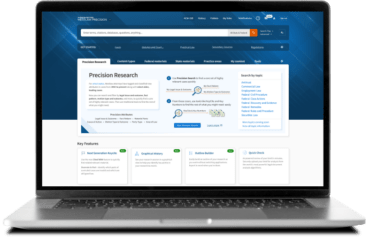Clients look to their litigation team to figure out how to get them the best resolution. And you look to precedent to figure out the viability of the case.
Now you can arrive at this wisdom more quickly and with more accuracy than ever before. The new generative AI Claims Explorer skill in Westlaw Precision with CoCounsel from Thomson Reuters simplifies your efforts to avoid pursuing weak or nonviable cases and helps you choose the best claim earlier in the process.
Jump to ↓
| Is there a “there” in there? |
| How lawyers select claims today |
| Generative AI delivers a better claims research approach |
| Making the best decision, faster |
Is there a “there” in there?
Litigators are used to putting substantial effort into case evaluation. You check case law and statutes based on the facts to see if it’s worth pursuing, for you and your client. This helps you make the best decision early in the matter and allocate resources throughout the matter.
You may be filing a lawsuit, bringing counterclaims, or checking for potential liability based on a set of facts. In any of these instances your first step will be to identify the applicable claims. Finding all the claims is the only way to be sure you have the right information to determine viability and choose the right claim. Some claims are easier to plead or prove. Some provide for attorneys’ fees or higher damages. Some will fit better with the facts. Choosing the wrong claim can result in futile, expensive litigation, unexpected settlements, and upset clients.
You can try to amend the case later, but it’s an expense and it can become too late. One federal judge in California responded to a request to add a claim that, “A claim based on such behavior should have been asserted under a legal theory other than breach of oral contract. One such theory might be negligent representation.” And a federal judge in Louisiana wrote, “All purported new claims could have and should have been asserted long before now since the facts underlying the legal theories advanced were or should have been known. “
How lawyers select claims today
Most litigators feel this pressure acutely. A review of Westlaw Precision with CoCounsel documents for requests to add claims showed that lawyers from the most reputable firms are frequently looking to change course. It’s hard to get it right the first time because there are so many ways to miss the “best” claim.
As one legal professional told us, “It can be difficult to know or think of all possible counterclaims, especially more obscure ones. Missing important counterclaims can have major implications later on in a case.”
Say you are trying to select the best claim for where an insurer exceeded its access to a customer’s computers by reading emails, then exposed the login and password in a PACER filing. You need to determine which federal claims are available to the client whose emails were accessed.
These facts will point you to the obvious state common law claims like invasion of privacy and negligence. The only federal statutory claim that would come up is a claim under the Computer Fraud and Abuse Act (CFAA). From there you might see if other cases were brought alongside a CFAA claim. That would lead you to the Stored Communications Act.
But actually, the best federal claim, if you can prove it out, is the Wiretap Act because of higher statutory damages. Despite hours of running searches and reviewing documents, you missed it. And you might have declined or understaffed this case because you didn’t understand the potential damages.
Generative AI delivers a better claims research approach
The new Claims Explorer on Westlaw Precision with CoCounsel makes it much easier to find all the relevant federal claims for your facts. It uses generative AI and new material about federal claims created by Thomson Reuters attorney editors to help you see all possible claims in minutes rather than hours.
With this feature, you enter a short description of the facts of your case and hit submit. In a few minutes you’ll see your results. For the wiretap case, Claims Explorer will return:
- The CFAA claim
- The Stored Communications Act claim
- The Wiretap Act claim – the best claim and one that didn’t appear in manual searches, if you include a state, all the common law claims that might apply and various state statutes involving data privacy, computer access, etc.
You saved hours of work and were confident you didn’t miss a claim. You now have all the relevant precedents and information you need to identify the potential challenges or weaknesses in the claims.
Making the best decision, faster
Knowing all the potential claims is critical to determining whether the case in front of you is worth pursuing and how to pursue it.
Claims Explorer on Westlaw Precision with CoCounsel streamlines your efforts significantly. It helps you get to the heart of the matter quickly and feel confident you haven’t missed anything.
Armed with the insight from Claims Explorer, you can quickly determine if there’s a “there” there. You can save time, improve your decision making on case viability, and more strategically allocate resources toward matters based on their odds of success.
Claims Explorer is available on Westlaw Precision with CoCounsel. Experience faster, more efficient case assessments for yourself.












